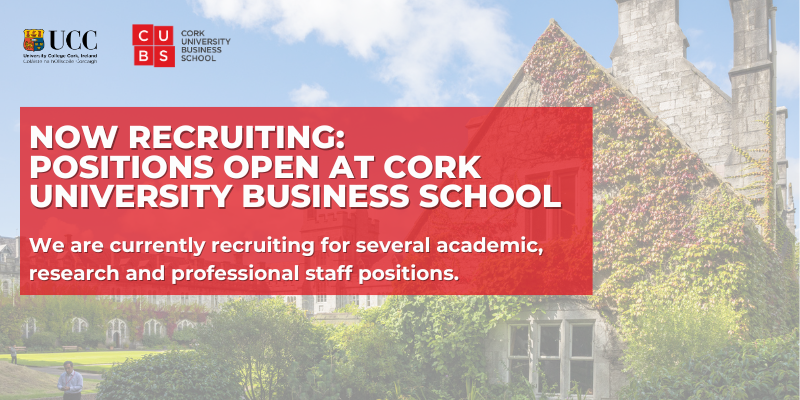
We’re Hiring at Cork University Business School, University College Cork.
We are currently recruiting for several academic, research and professional staff positions.
read more
We are currently recruiting for several academic, research and professional staff positions.
read more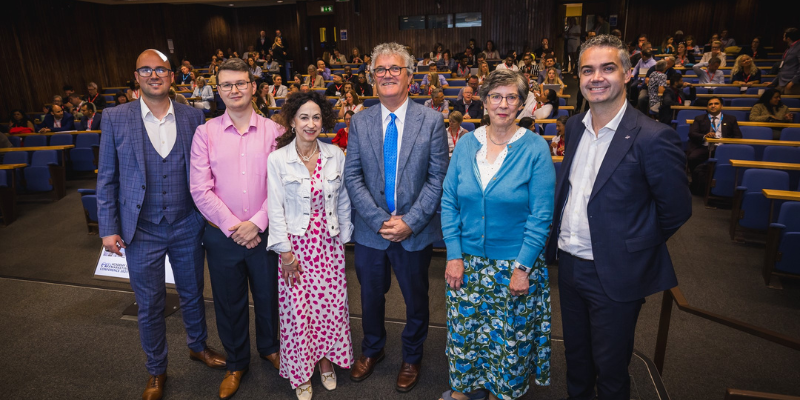
Marketing leaders, academics, and researchers from around the world have arrived in Cork for the Academy of Marketing Conference 2025. The week-long event brings together over 300 delegates.
read more
The announcement was made by Microsoft on June 24, 2025, recognizing outstanding female tech leaders across the EMEA partner ecosystem. Breda is a Business Informations Systems Graduate.
read more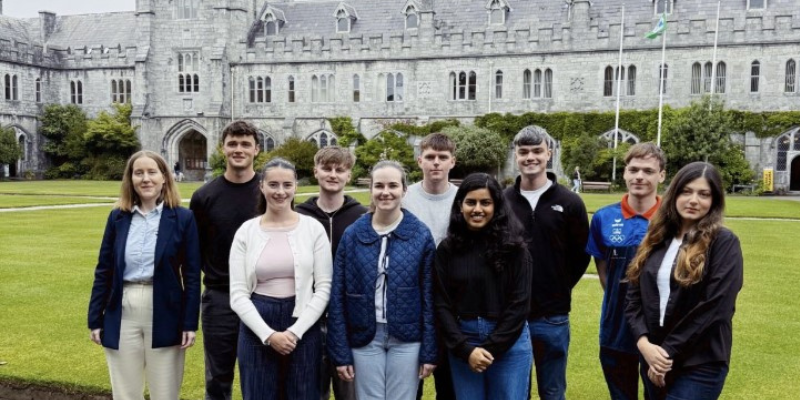
This summer, Cork University Business School has been particularly active with its offerings of entrepreneurial activities that span across the country and numerous industry sectors.
read more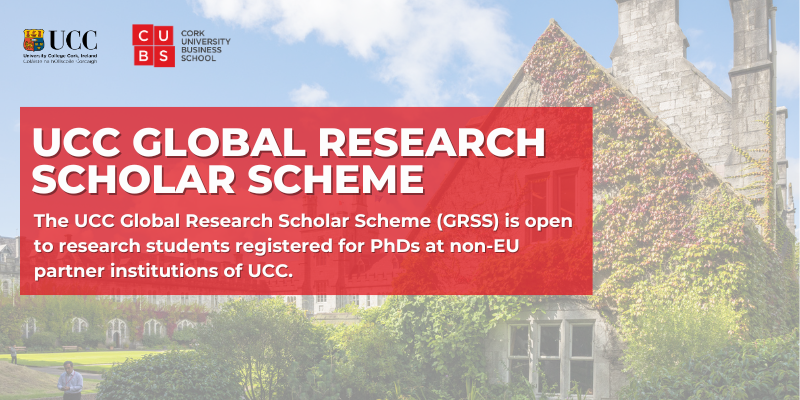
The UCC Global Research Scholar Scheme (GRSS) is open to research students registered for PhDs at non-EU partner institutions of UCC.
read more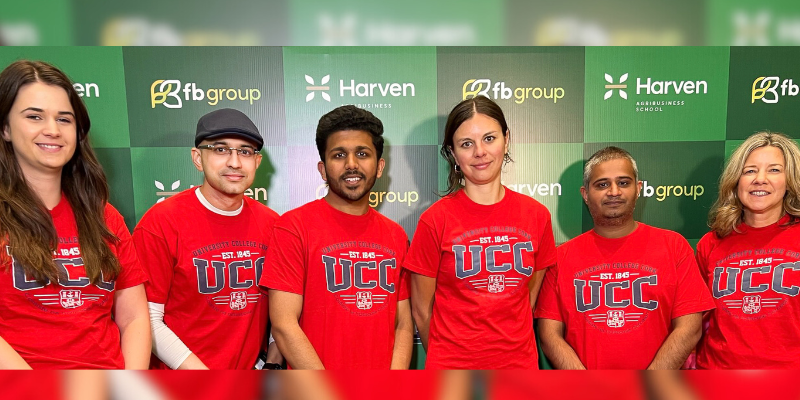
MSc Business Economics student Shubhojit Bagchi, along with his three teammates, represented Cork University Business School at the IFAMA World Conference and Student Case Study Competition in Brazil
read more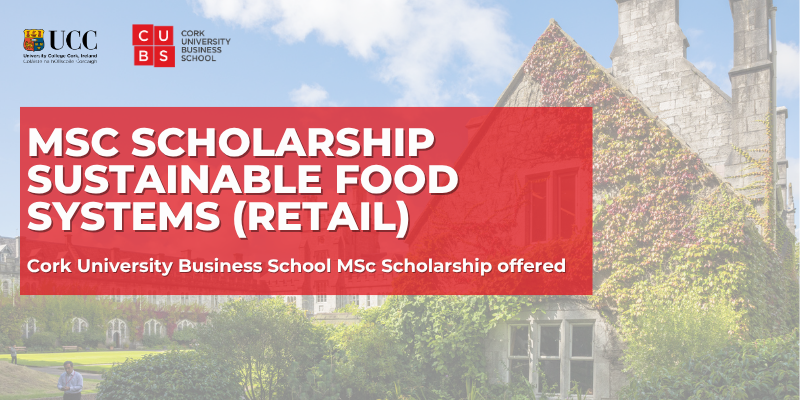
Cork University Business School (CUBS) offering 2-year MSc scholarship for Sustainable Food Systems (Retail). Closing date is 1 September 2025.
read more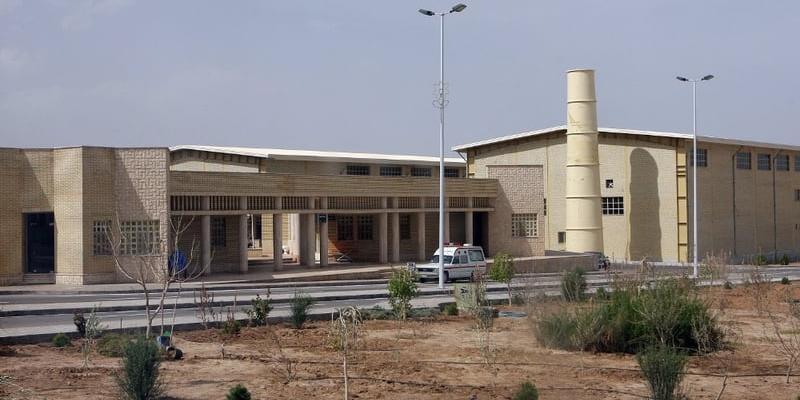
Analysis: The Stuxnet digital virus attack, discovered in 2010, was a major setback for Iran's nuclear ambitions and sparked a global cyber boom. Dr Stephen Treacy writes in RTE Brainstorm
read more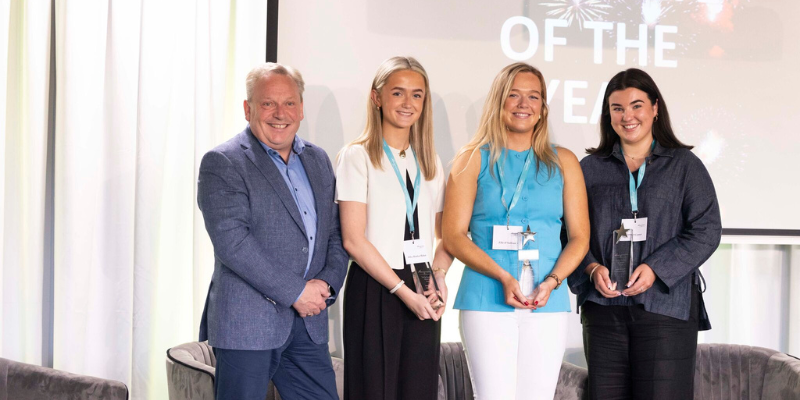
Huge congratulations to BComm students Abbey Hanlon Mahar, Ciara O'Connor, and Ellie O'Sullivan, who have won the 2025 Musgrave Intern Innovation Award.
read more
It is a great source of pleasure to welcome the Academy of Marketing Conference to Cork University Business School at University College Cork, Ireland in the summer of 2025.
read more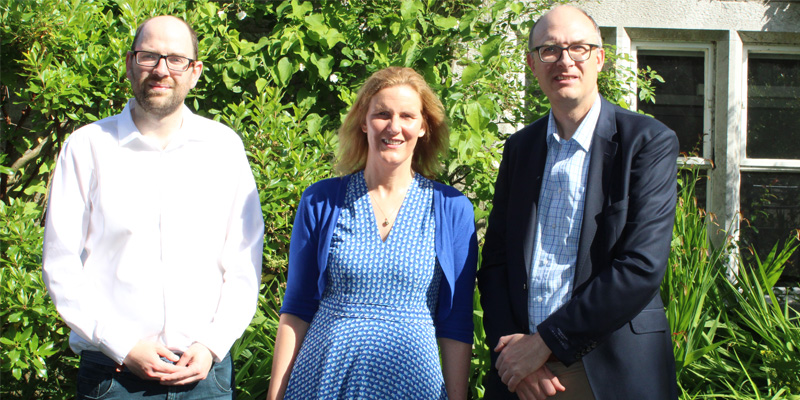
The ‘Supporting and scaling up the just transition to the circular economy’ (Scaling4JustCETransition) project will tackle a major gap in circular economy research in Ireland
read more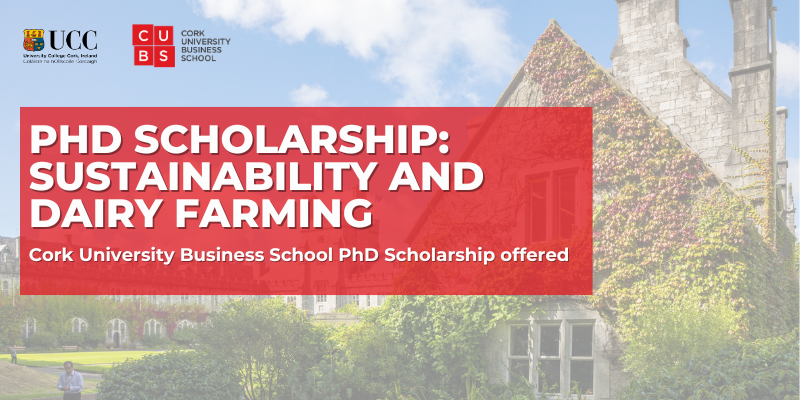
This prestigious PhD Scholarship offers an annual stipend along with fee contribution; funding is provided as part of the BiOrbic Research Ireland Centre for Bioeconomy, in collaboration UCC & Teagasc
read more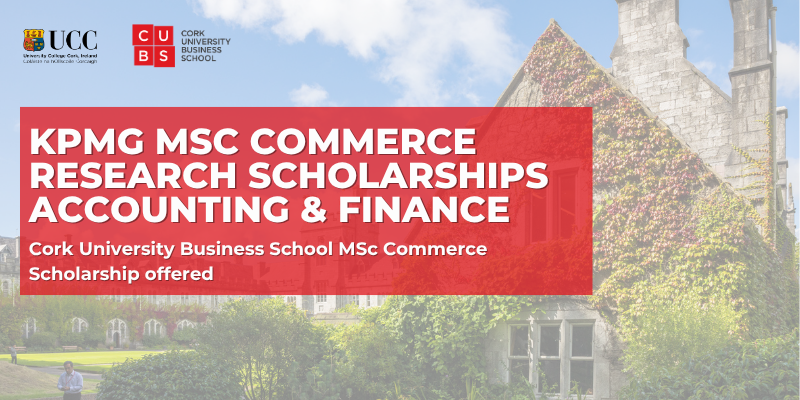
Cork University Business School (CUBS) and its departments offering MSc scholarships, open to both Home/EU and international students.
read more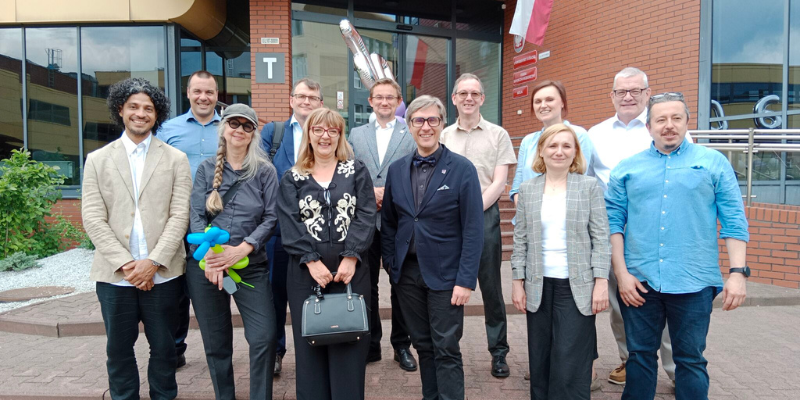
Dr JB McCarthy, Vice Dean Internationalisation & External Engagement at Cork University Business School, represented UCC at a recent meeting of faculties from across the UNIC alliance of universities
read more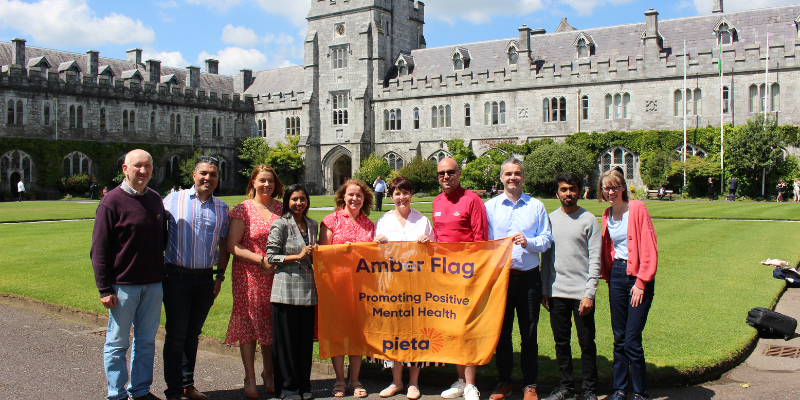
We’re proud to share that Cork University Business School has been awarded the Pieta Amber Flag
read more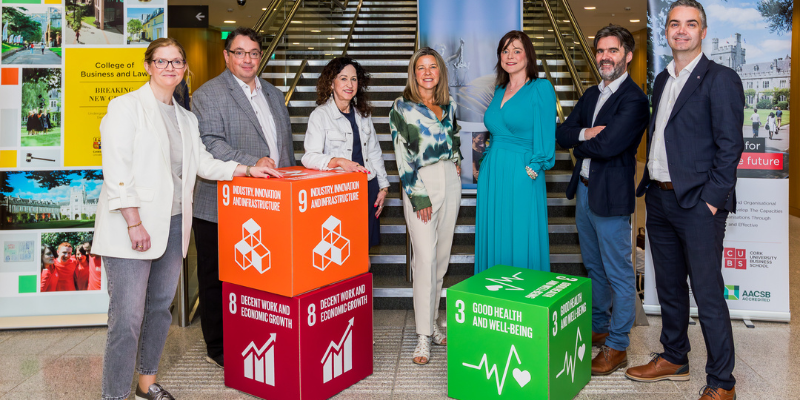
The College of Business and Law hosted its 2025 Research Showcase at the Western Gate Building a day dedicated to highlighting the impactful sustainability research happening across the College.
read more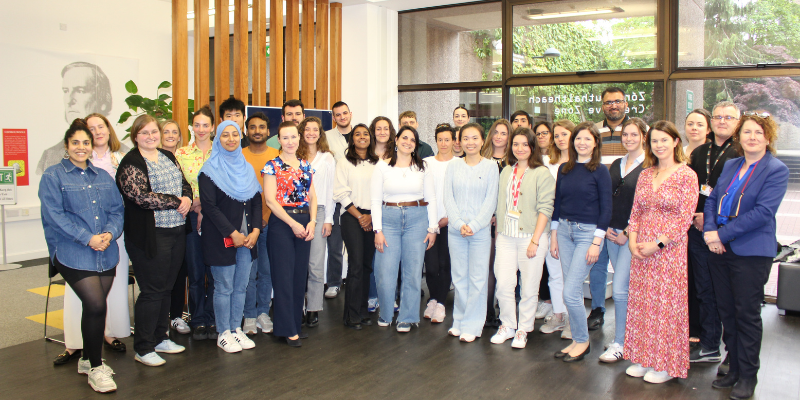
Cork University Business School hosted a Hackathon for Marie Skłodowska-Curie Actions (MSCA) funded doctoral candidates and postdoctoral researchers on 12th June 2025.
read more
Everyone at CUBS is immensely proud of current Food Marketing and Entrepreneurship programme student Alex Kendellen on his first call up to the Irish Senior Rugby team.
read more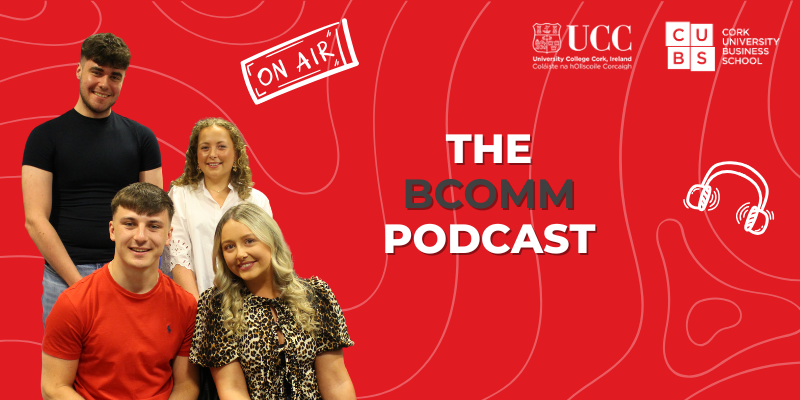
In this episode, four students from the Commerce programme sit down for an open conversation about their experiences so far.
read more
Tanja Tauschek, a visiting PhD student at CUBS, talks about her research at the UCC, her passion for gender equality and why her PhD became a shared family adventure.
read more
CUBS at UCC and the Gaelic Players Association have partnered to offer two new postgraduate scholarships, designed to support GPA members pursuing taught master’s degrees at CUBS.
read more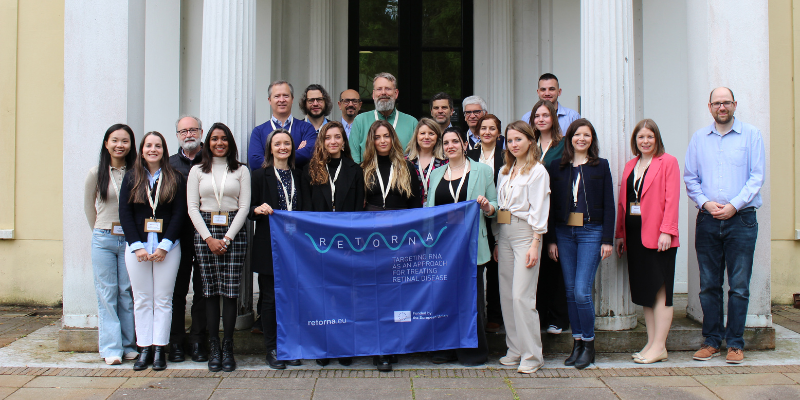
The Department of Economics in Cork University Business School, are delighted to host the 2025 Summer School and secondment for the RETORNA MSCA Doctoral Network Programme over two weeks in June.
read more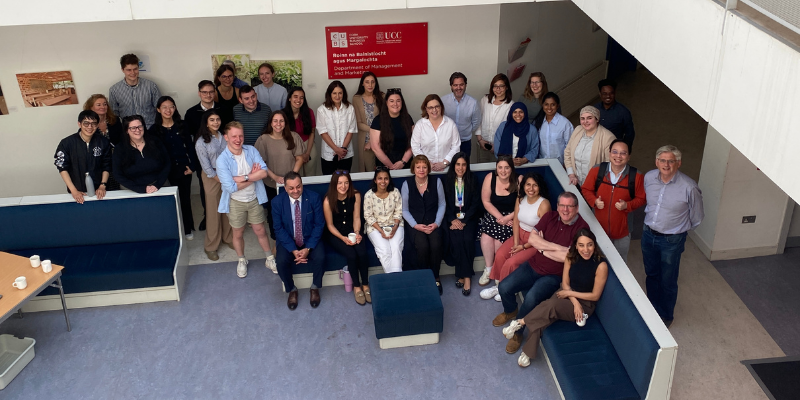
On Thursday, 22 May 2025, CUBS hosted its annual Postgraduate Research Symposium, bringing together PhD students, supervisors and faculty for a vibrant day of knowledge exchange and community building
read more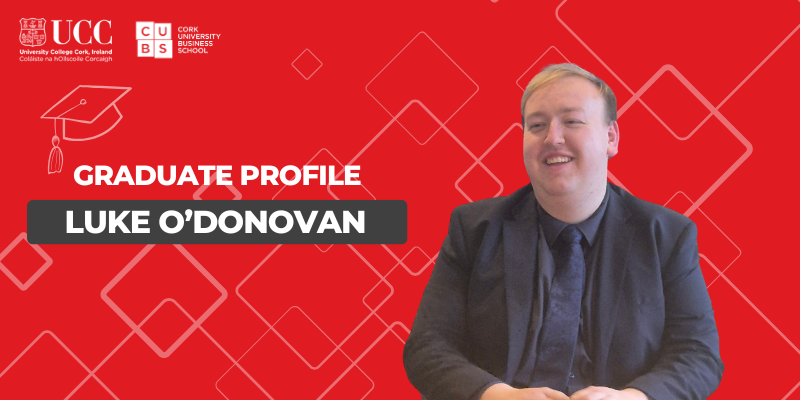
Luke, a recent graduate of the MSc in Management and Marketing degree at Cork University Business School (CUBS) at University College Cork (UCC) shares his experience of the programme.
read more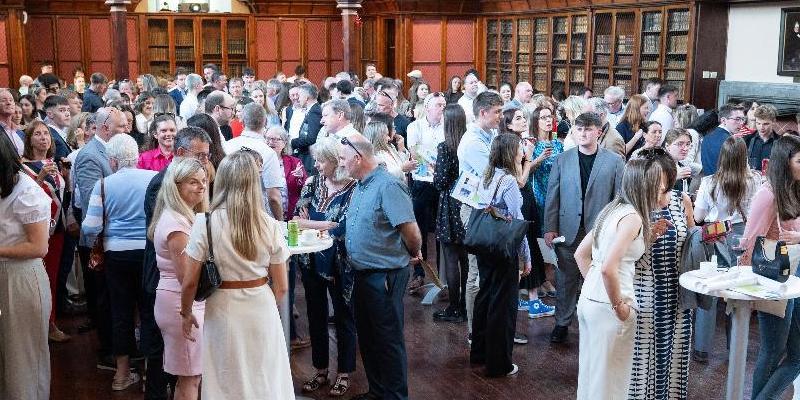
The College of Business and Law at University College Cork recently held its annual scholarships and prizes ceremony, celebrating the exceptional accomplishments of its students.
read more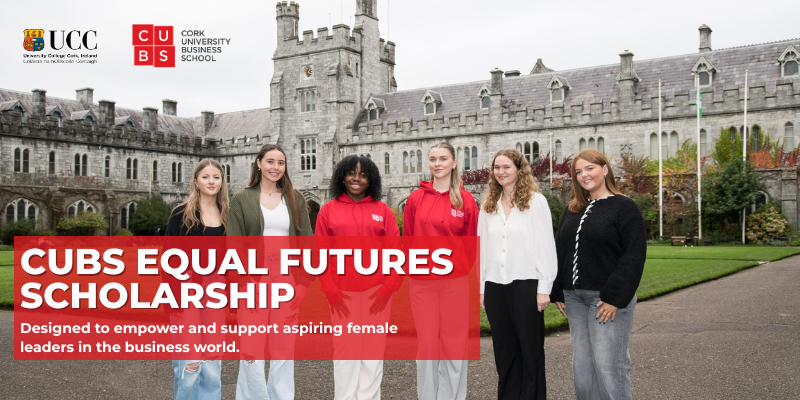
CUBS is proud to announce the Equal Futures Scholarship, a new initiative aimed at empowering the next generation of female business leaders.
read more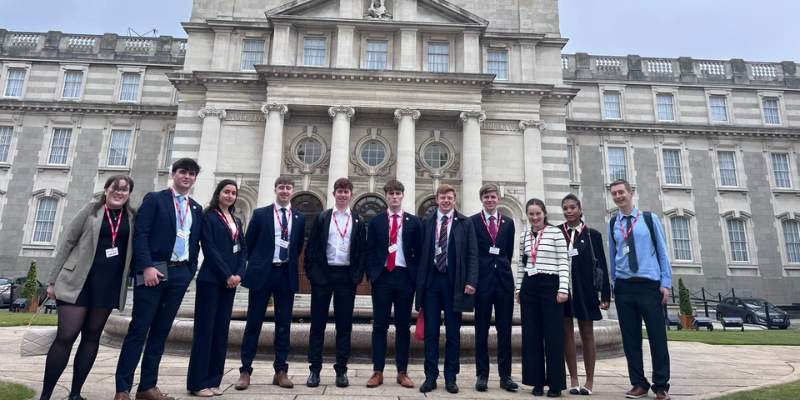
Students from the Economics Society had the unique opportunity to visit Government Buildings in Dublin as part of the society’s initiative to bridge academic learning with real-world policymaking.
read more
The Health Minister faces a full agenda, with numerous ongoing issues to manage – and no doubt new challenges on the horizon. – Brian Turner writes for the medical independent.
read more
CUBS Shines in UCC Hockey’s Unprecedented Triple Win
read more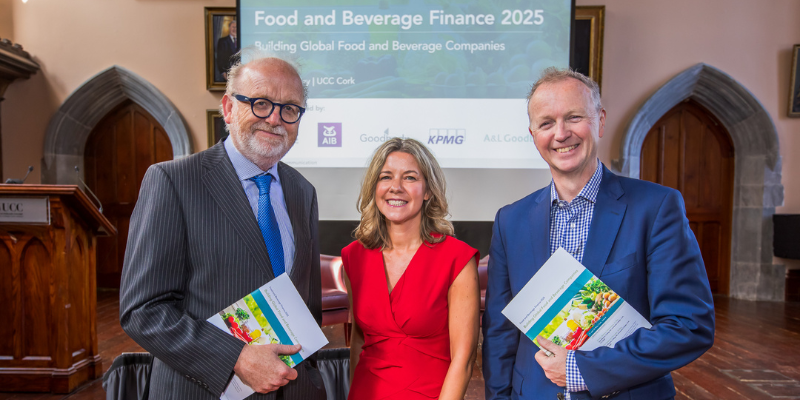
The global food and beverage sector faces "intense uncertainty" from tariff threats, weakening consumer sentiment and ongoing cost of living pressures, a new report launched by University College Cork
read more
Cork University Business School at UCC is pleased to offer a range of Executive MBA scholarships designed to support talented professionals in their leadership journey.
read more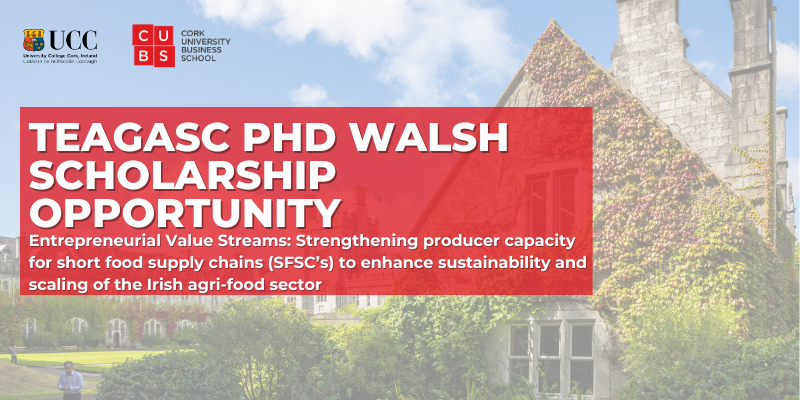
This PhD offers an exciting opportunity to undertake innovative research to support the sustainability of the Irish agri-food sector through examination of alternative value streams.
read more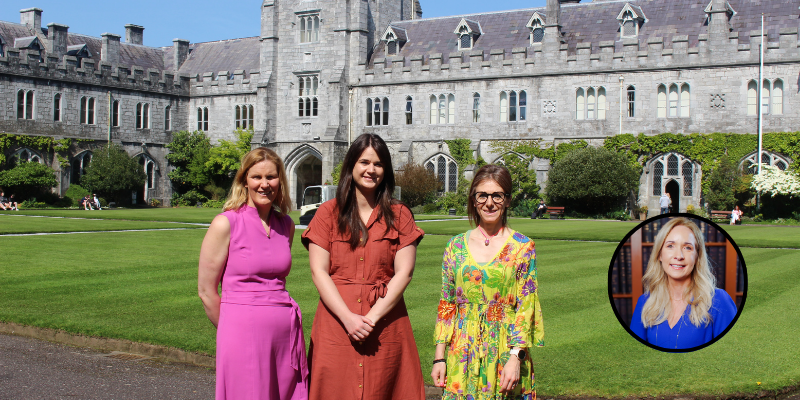
Researchers from Cork University Business School have joined a major new initiative to unlock the economic potential of anaerobic digestion (AD) in Ireland.
read more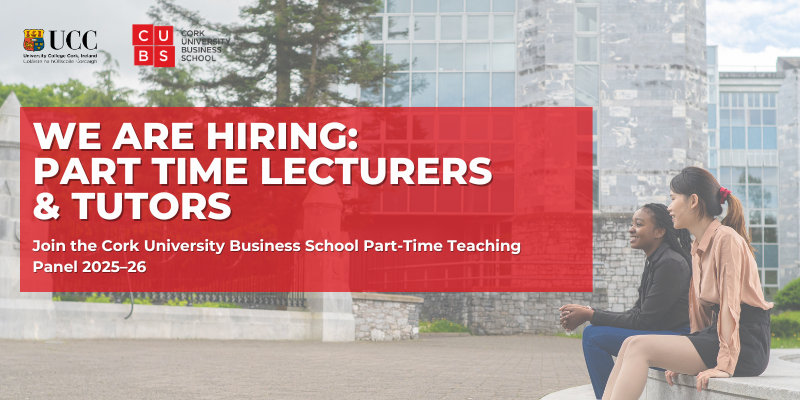
We are inviting applications from suitably qualified individuals with relevant experience who are interested in tutoring and/or lecturing on an hourly occasional part-time basis
read more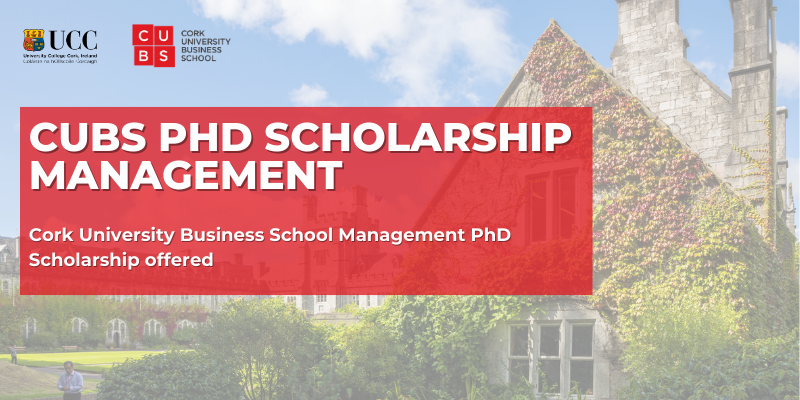
CUBS is offering a PhD scholarship to commence in October 2025. This scholarship is open to both Home/EU and international students and will cover fees (EU/non-EU) and a monthly stipend for 4-years
read more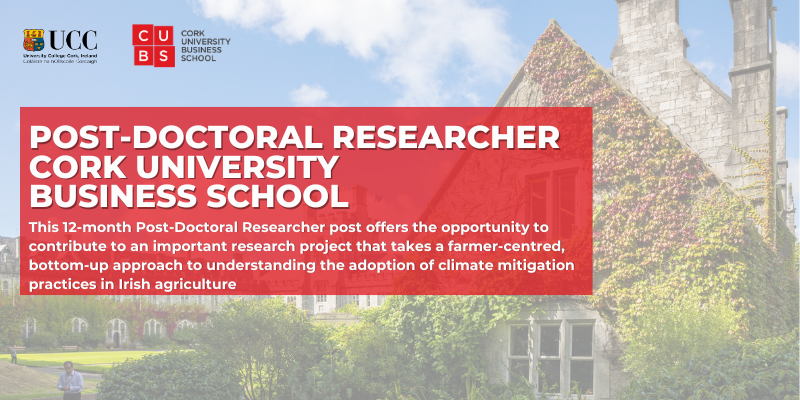
Cork University Business School invites applications for a motivated and research-focused individual to join the UCC TEAGASC DAFM-funded EMIT-CHANGE project in the role of Post-Doctoral Researcher.
read more
We are offering a PhD scholarship to commence in Oct 2025. This scholarship is open to both Home/EU and international students and will cover fees (EU/non-EU) and a monthly stipend for a 4-year period
read more
Cork University Business School (CUBS) is offering 1 PhD scholarship in Economics to commence in October 2025. This project is funded through collaboration with the UNIC Initiative
read more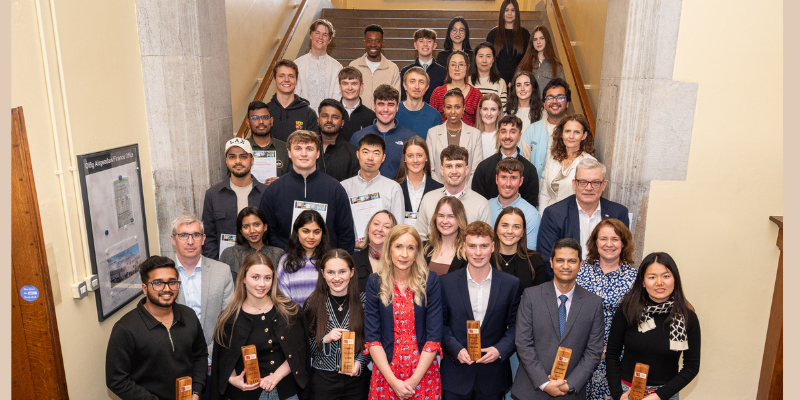
Cork University Business School Leaders of Tomorrow (LoT) is a student-centric school-wide initiative to recognise the substantial impact of students beyond the classroom and academic grades.
read more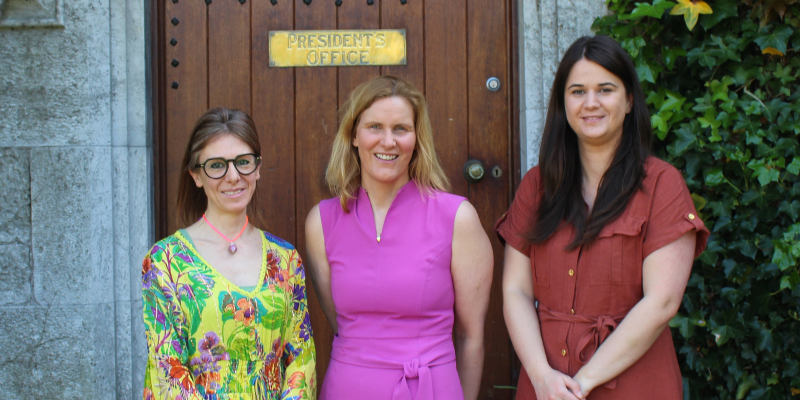
Three researchers from the Department of Economics at CUBS, UCC, have secured funding as part of a groundbreaking project aimed at revitalising Ireland’s wool industry through sustainable innovation.
read more
UCC marketing students contributed to a road safety initiative led by ULand An Garda Síochána which sa third-level students highlight the deadly consequences of distracted driving.
read more
Michelle Carr, professor in Accounting (Sustainable Business) and Head of Department writes for RTÉ Brainstorm.
read more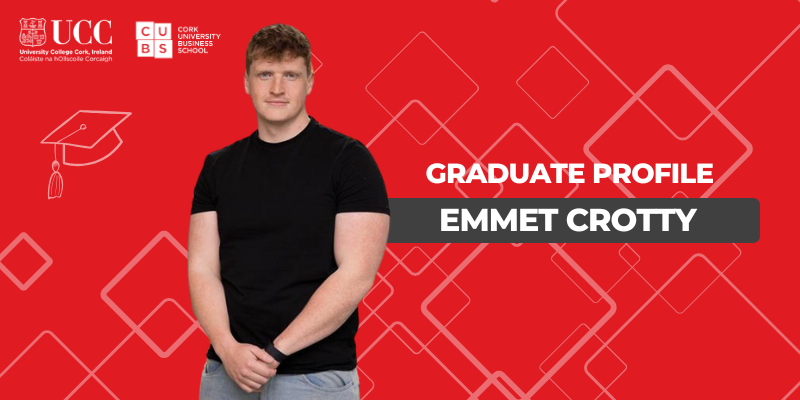
Emmet Crotty graduated from CUBS with a BSc in Business Information Systems (BIS) and has used his degree and experience as a musician to create his own company Gigify.
read more
Dr Olive McCarthy, senior lecturer and director of the Centre for Co-operative Studies at CUBS writes for RTÉ Brainstorm.
read more
Dr Oliver Browne, Lecturer in the Department of Accounting and Finance at CUBS writes for RTÉ Brainstorm.
read more
AJ Nagle, PhD student in the Centre for Co-operative Studies at CUBS writes for RTÉ Brainstorm.
read more
We are pleased to announce that applications are now open for the Fulbright Scholar Program 26/27. We are seeking to attract an outstanding scholar whose work aligns closely with our vision and values
read more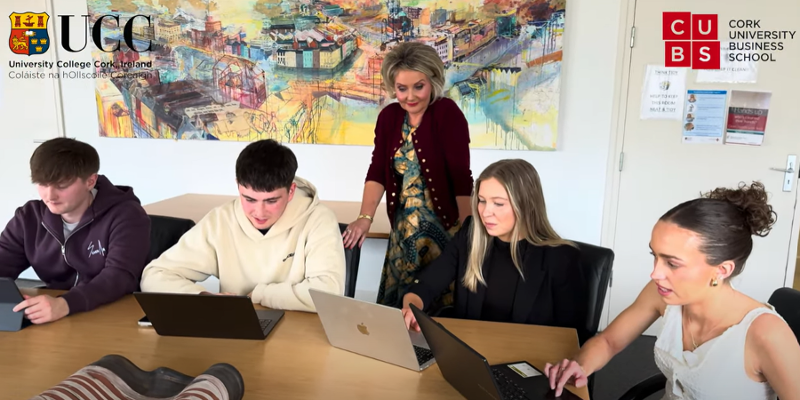
Our Annual BComm convention. Hear from programme Director Dr Rosemary Murphy and students as they outline their Market Games Project.
read more
Conor Loughnane, Lecturer in the Department of Accounting and Finance at CUBS writes for RTÉ Brainstorm.
read more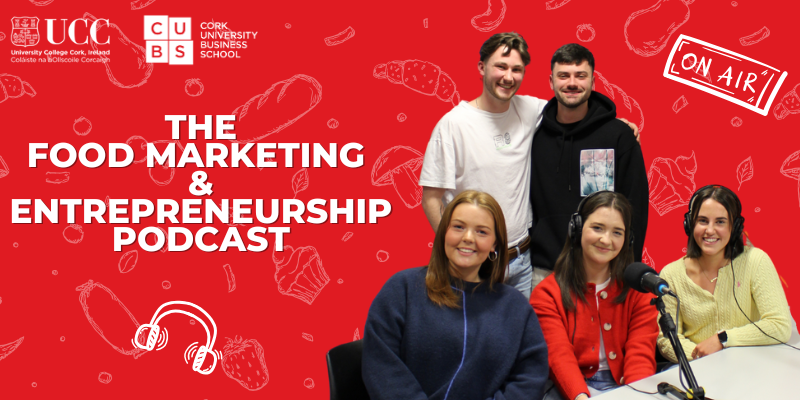
In this episode, five students from the Food Marketing and Entrepreneurship programme sit down for an open conversation about their experiences so far.
read more
Dr Oliver Browne, Lecturer in the Department of Accounting and Finance at CUBS writes for RTÉ Brainstorm.
read more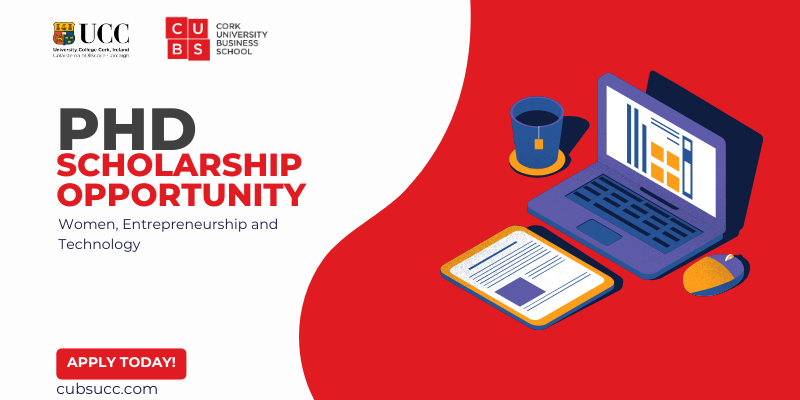
Cork University Business School (CUBS), University College Cork invites motivated and talented graduates with outstanding academic records to apply for this funded PhD Scholarship on Women.
read more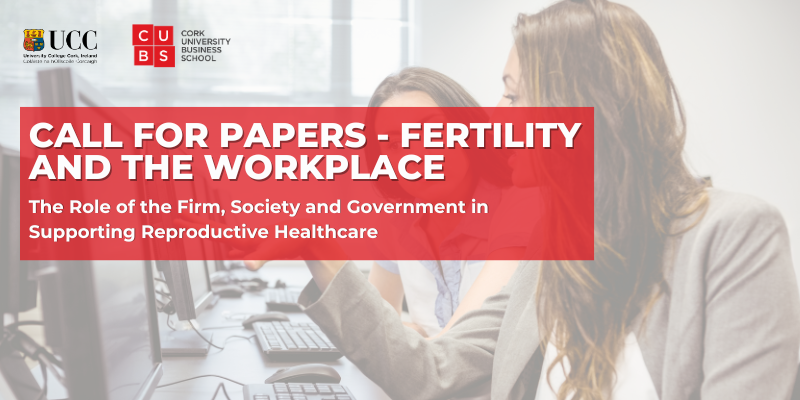
The challenges women face in the workplace regarding reproductive healthcare are becoming increasingly complex and politicized. Open for Submissions: June 2nd– September 1st, 2025
read more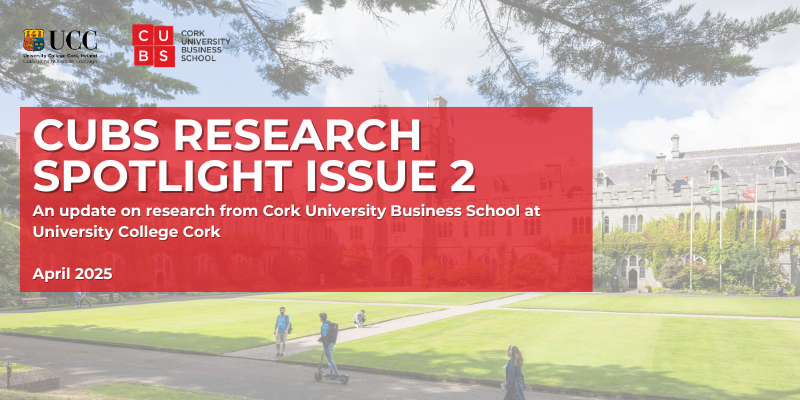
We are delighted to share the 2nd issue of the CUBS Research Spotlight newsletter. This issue gives a glimpse into some of our recent funding successes, recognising the many notable achievements.
read more
Dr Fergal O'Connor, Senior Lecturer Financial Economics at CUBS writes for RTÉ Brainstorm.
read more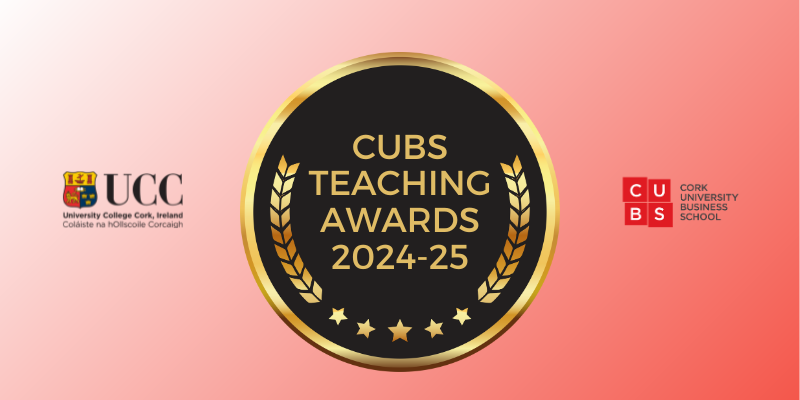
Nominations are now open for the 2024-25 CUBS Teaching Awards. Nominations can be made by fellow CUBS staff or by students.
read more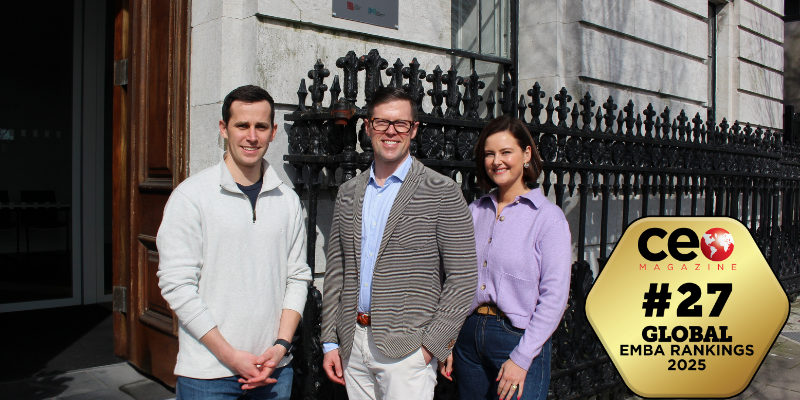
Cork University Business School is proud to announce that our Executive MBA program has been ranked 27th Globally in the CEO Magazine Global MBA Rankings for 2025.
read more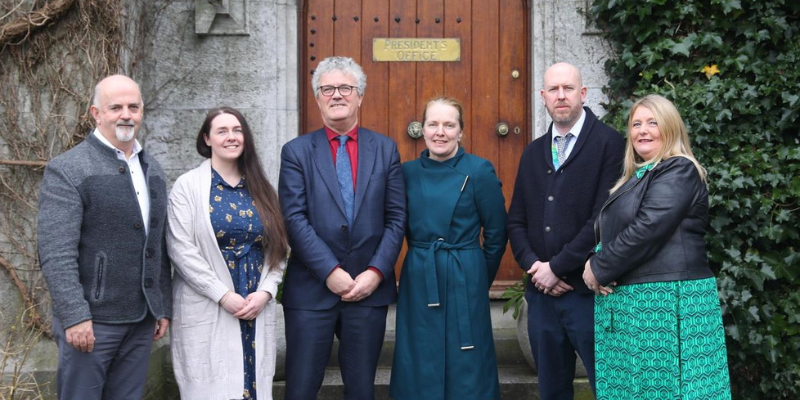
This week marks Global Money Week (March 17th-23rd,), an annual initiative led by the OECD International Network on Financial Education (OECD/INFE) to promote financial awareness among young people.
read more
Final year International Business with Languages student Ava-Rose Gallagher shares her experience as a CUBS student at UCC and the last five years with the Irish Examiner.
read more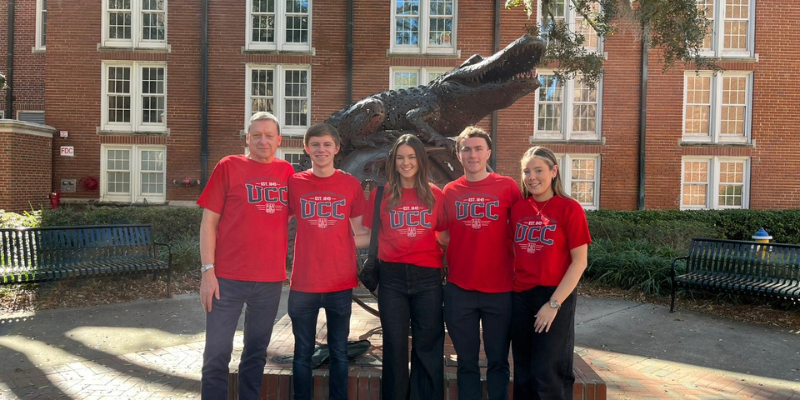
Final year commerce student Lucie O'Neil along with her team represent Cork University Business School at the Heavener International Case Competition in Gainesville, Florida.
read more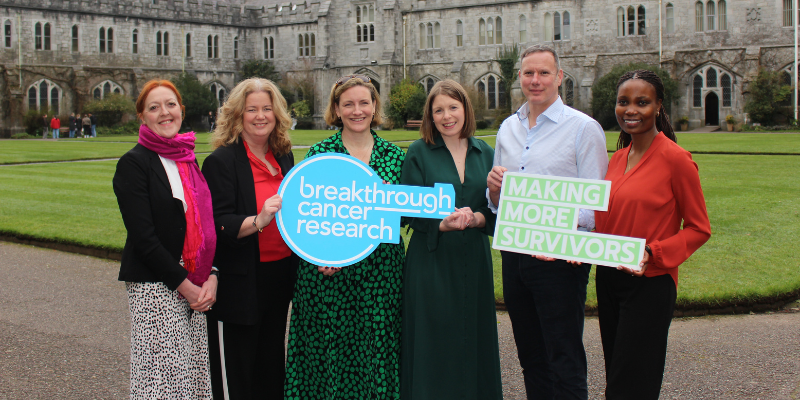
Dr. Aileen Murphy, alongside co-applicants Dr. Ann Kirby and Prof. James Clover, has secured €49,999 in funding for a groundbreaking study on the health economics of electrochemotherapy in Ireland.
read more
Patrick Tiernan, MSc ISBP (Information Systems for Business Performance) Graduate, was featured in Silicon Republic.
read more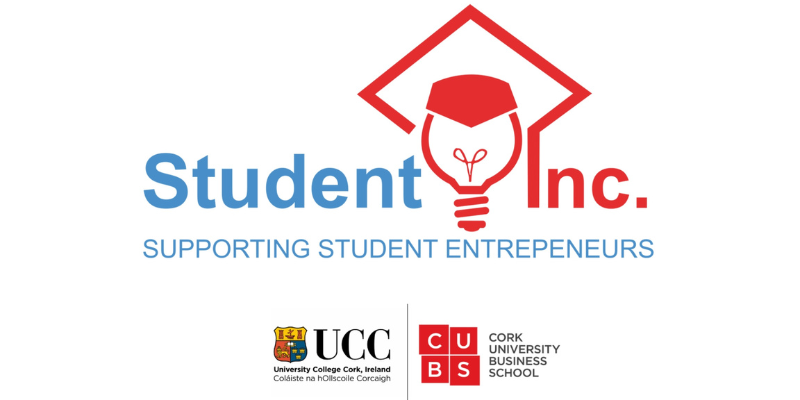
Apply to Ireland’s Longest Running Student Entrepreneurship Accelerator Programme: Student Inc. is Now Open for Applications from UCC Students.
read more
VistaMilk represents a unique collaboration between 13 Agri-Food and ICT research institutes and leading Irish/multinational food and ICT companies. The Centre is hosted by Teagasc.
read more
Congratulations to Deirdre Ní Choistín, graduate from our Masters in Business, Advanced Strategic Performance, leadership and innovation programme who was recently appointed director general of TG4.
read more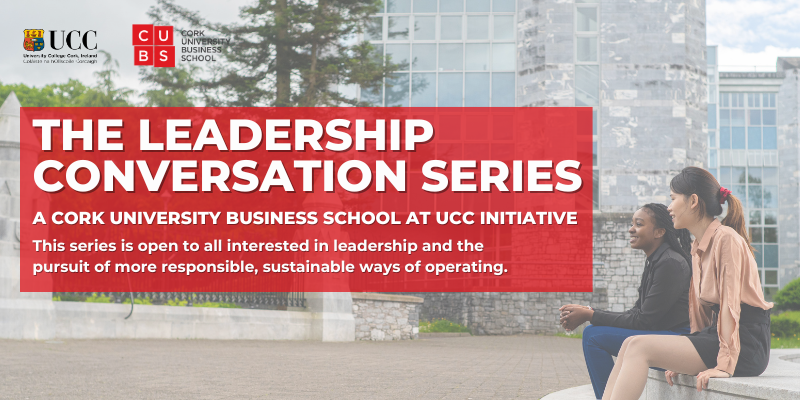
Cork University Business School is excited to announce the launch of The Leadership Conversation Series, a new initiative designed to bring together influential leaders from across business and beyond
read more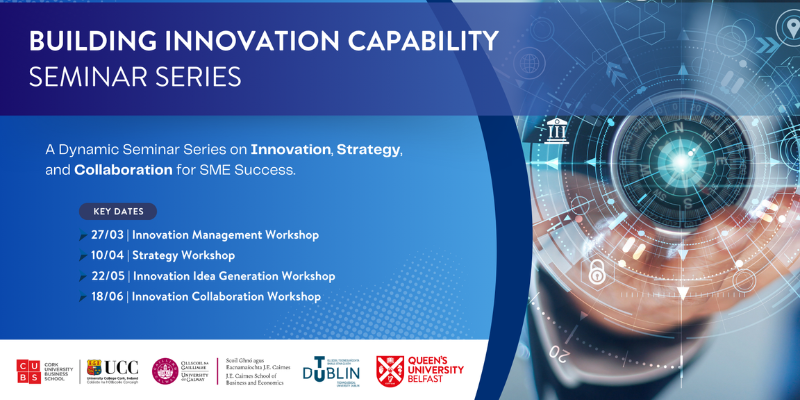
To support SME competitiveness on an All-Ireland basis, 4 universities including UCC have partnered to design and deliver a free 4-part seminar , entitled Building Innovation Capability for Business
read more
So, you’re coming to the end of your undergrad and thinking, what next? Or maybe you are thinking of changing your career path, and you want a career that’s interesting, well-paid, and going somewhere
read more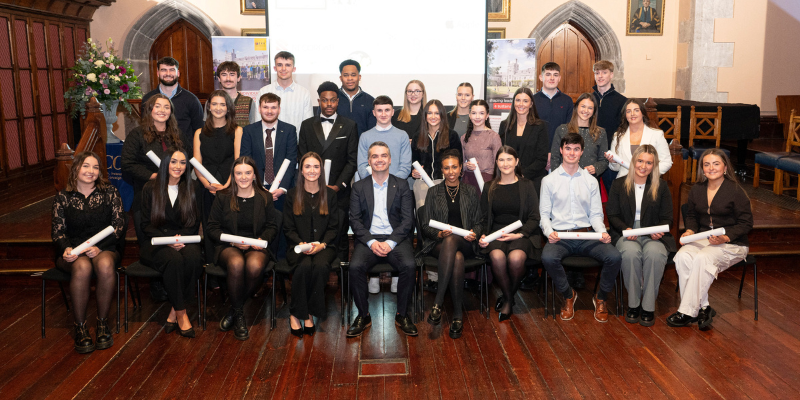
Cork University Business School (CUBS) proudly hosted its first-ever Student Work Placement Awards, celebrating the outstanding achievements of students across six undergraduate programs.
read more
Dr Oliver Browne, Lecturer in the Department of Accounting and Finance at CUBS writes for RTÉ Brainstorm.
read more
Veyda Brickley recently completed her BComm International with Hispanic Studies (BSc International Business with Languages) at UCC and shares her experiences, including her Erasmus year in Barcelona.
read more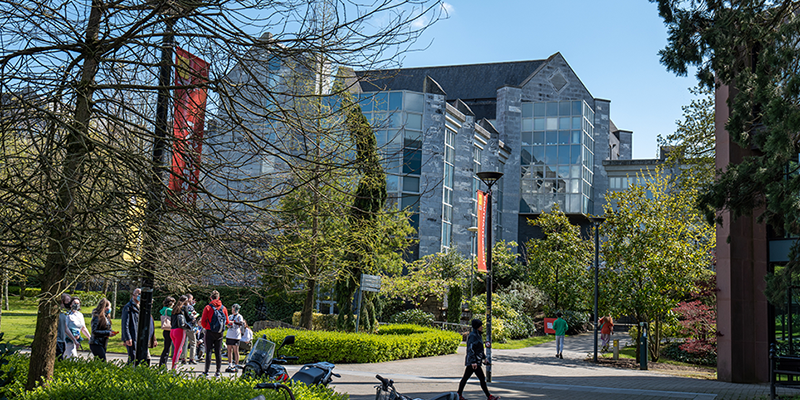
An update for current students in relation to the CUBS script viewing schedule for 2024-2025
read more
Dr Oliver Browne, Lecturer in the Department of Accounting and Finance at CUBS writes for RTÉ Brainstorm.
read more
CUBS graduates Cara Griffin and Dearbhla Richardson were awarded at UCC’s Graduate Awards Ceremony, highlighting their achievements for their academic excellence and contributions to student life.
read more
Dr Oliver Browne, Lecturer in the Department of Accounting and Finance at CUBS write for RTÉ Brainstorm.
read more
Adam Murphy, a Quercus Scholar and second-year Business Information Systems (BIS), Cork University Business School (CUBS) student, has had an exciting few months.
read more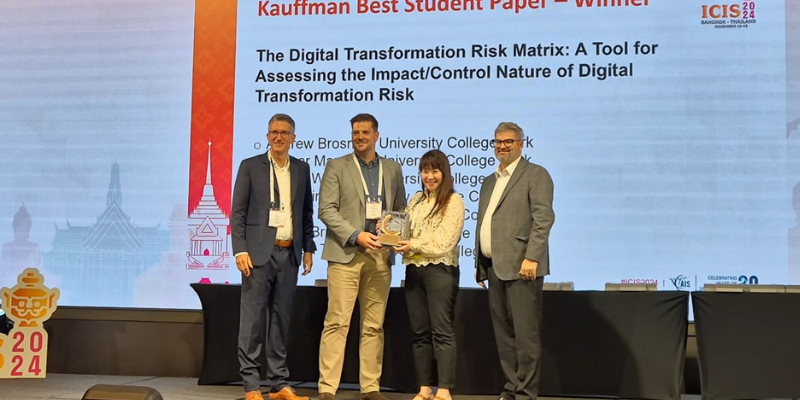
Dr. Stephen Treacy and his team have been honoured with the Kauffman Best Student Paper Award at the International Conference on Information Systems (ICIS) in Bangkok.
read more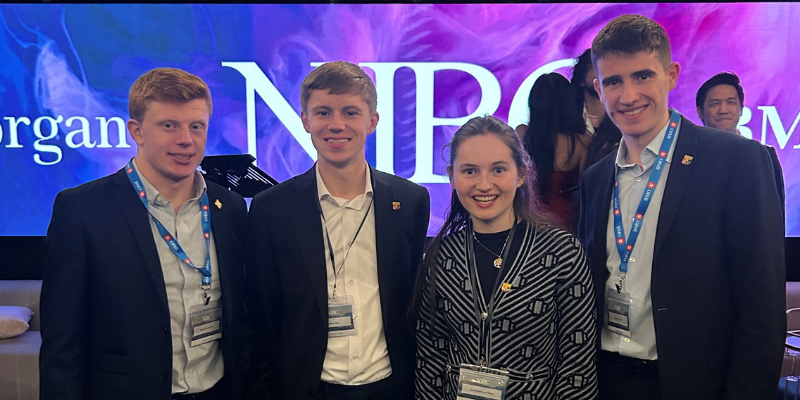
CUBS Finance Students Lia O’ Brien, Michael Dore, Oisín Mac Sweeney, Eoghan O’Sullivan, and Barry McCarthy competed in the 2025 National Investment Banking Competition, held in Vancouver Canada.
read more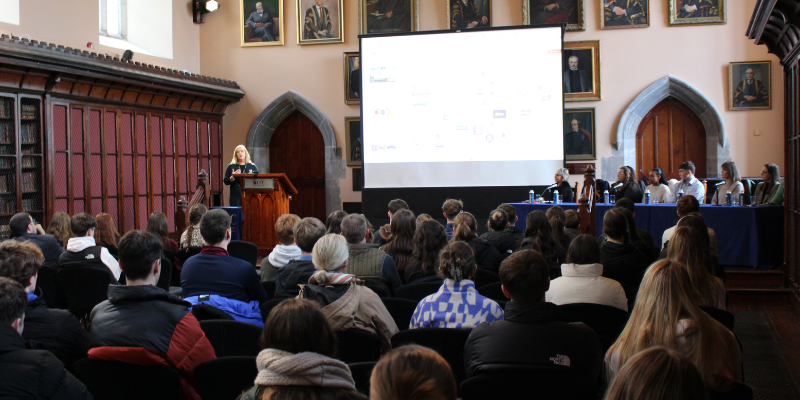
We hosted the Annual BComm Employability Showcase. The event was a significant opportunity to explore the Unique Features of the Commerce CK201 programme.
read more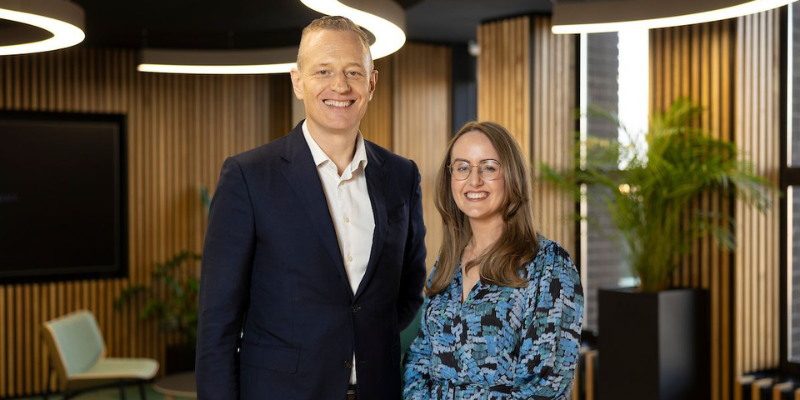
MSc Economics graduate, Kate English has been appointed Deloitte Ireland's first ever Chief Economist.Kate joined Deloitte in December 22, where she established and led the Real Estate Research team.
read more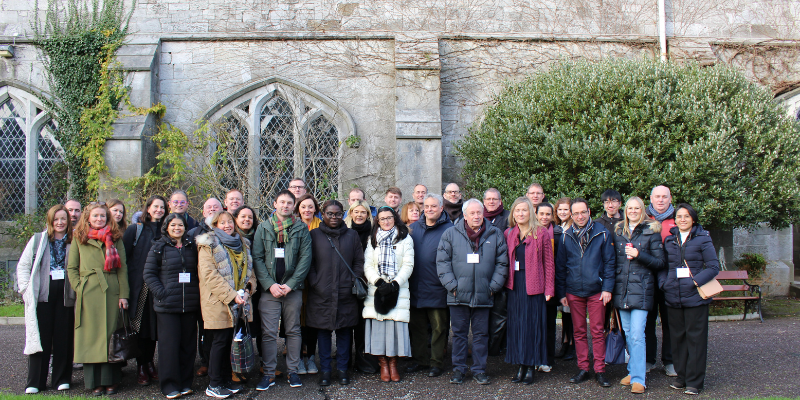
Cork University Business School's Accounting and Finance department had the honor of hosting the 7th Accounting, Auditing, and Accountability (AAE) Conference.
read more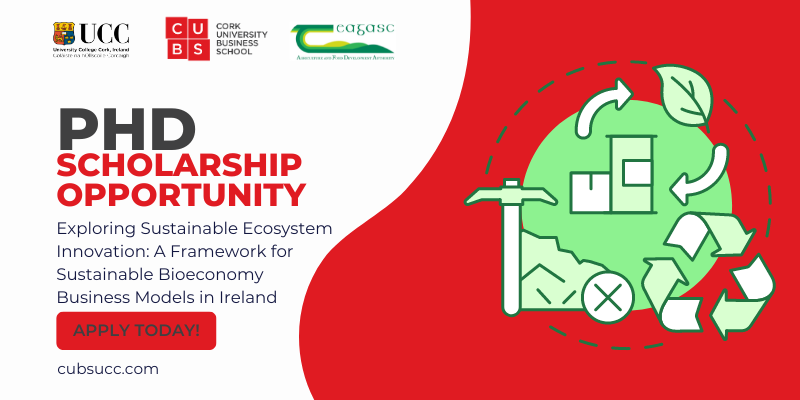
4 Year PhD opportunity Exploring Sustainable Ecosystem Innovation: A Framework for Sustainable Bioeconomy Business Models in Ireland. Teagasc Walsh Scholarship
read more
Stephen Treacy of Cork University Business School UCC writes for RTE Brainstorm about the danger of shopping scams on consumers on Black Friday.
read more